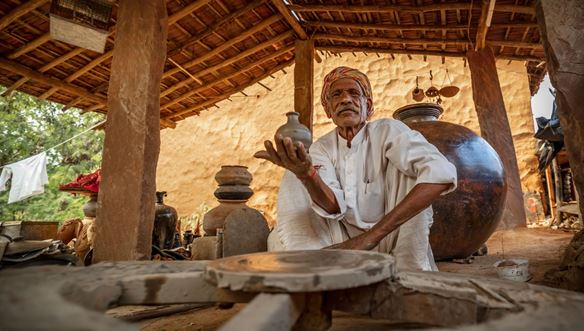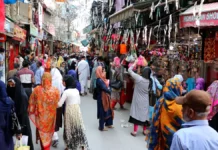Successful start-up stories inspire aspiring entrepreneurs to believe in themselves and work towards their goals. Stereotypically, entrepreneurship revolves around manifesting innovative ideas with the aspiration to earn profits. But some start-up’s stories initiate when the consciousness of individuals reflectss their morale social responsibilities. Such individuals take accountability for addressing social issues and ignite the duties of social entrepreneurship vested in them.
Social entrepreneurs who are transforming the lives of rural India
A country’s rural development exhibits economic growth. Thankfully, there has been an increasing number of foundations in India that focus on such growth and development. These social enterprises take the responsibility of nurturing rural lives by providing income sources and improving the standard of living.
Let us go through some heroic stories that transformed lives and contributed to the national economy:
1. Mrida
Social entrepreneur Arun Nagpal followed his father’s dream to develop rural India. With an education background in Mechanical Engineering followed by a PGDM in Marketing & Finance, Nagpal was shining in the corporate sector.
In 2014, he took a big plunge and ventured as a social entrepreneur with Gurveen Kaur Sood and Manoj Khanna. Together, they started Mrida and brought prosperity to rural people through financially viable entrepreneurship models.
These models offer power access to remote villages in India through Mrida Renergy & Development (P) Ltd. They also support the cultivation and collection of valuable crops, herbs and plants. They reap healthy produces to retain traditional Indian medicines and distribute them through Mrida Greens & Organics Pvt.
Mrida started with two villages, four microgrids, and 19 solar LED street lights. They then moved forward to creating an e-hub that promoted education, e-commerce, and entertainment through a solar power initiative. They also incorporated the usage of an e-rickshaw.
The foundation was soon backed up by visionaries, including Mahindra & Mahindra that helped scale to two e-hubs, three e-rickshaws, and 18 solar microgrids in 11 villages. They also improved health, hygiene, sanitation, and agriculture interventions with new tools.
Mrida is self-funded with an investment of more than Rs. 4 crores. CSR initiatives by Infrastructure Leasing & Financial Services Ltd, Hero Motors Group (AG Industries, Rockman Industries), The Reliance Foundation for integrated Corporate Social Responsibility (CSR), and Mahindra & Mahindra Ltd. have lent significant support.
2. Selco
Harish Hande graduated from IIT Kharagpur and went onto do his PhD from the University of Massachusetts in 1994. He returned to India after exploring the benefits of rendering solar energy in Sri Lanka and the Dominican Republic.
Power shortage has been an ongoing problem in remote places in India. In 1994, almost after 50 years of Independence, a remote village Mullaria, in Kasargod district in Kerala, did not have electricity. The scenario was similar for over two-third of India back then and people depended on kerosene lanterns.
Mullaria soon revolutionized the usage of solar energy. The idea was backed by Hande, and his first customer was Arvind Rai, a local farmer in the village.
Hande tried to sell his innovative ideas to rural people, but nobody invested in his vision until Rai did. He agreed to set up his solar power free of cost to Rai and installed it with the help of the farmer’s mother.
The installation provided power to four lights in Rai’s house, after which the farmer was convinced of Hande’s initiative. He paid Hande Rs. 12,000, and that was the stepping stone for Selco.
Thousands of people living in rural and remote areas have invested in Selco’s products ever since. The company shares a sound financial model that allows them to pay 25% for solar products upfront and the rest in installments. The installments are structured based on a budget that the rural family can afford.
To date, Selco provided more than 450,000 solar solutions at the best possible price for the poor. They have associations with several NGOs to make social entrepreneurship sustainable and allow lenient financial structures for the needy.
3. Pipal Tree
Santosh Parulekar is the CEO and Co-founder of Pipal Tree Ventures Pvt. Ltd. He took the initiative to create job opportunities for the unemployed youth of rural India. Parulekar was working in a reputed bank in the west. He quit his secured high-paying job for the advancement of rural India.
Since 2007, Pipal Tree has been actively working towards offering responsible positions to jobless youth. They have prepared more than 1,500 specialists through their instructional hubs in India.
Pipal Tree has several training centers that educate youth with skills to help them earn a living. They fill in positions for common project workers in the sectors of painting, plumbing, electrical, tiling, false ceiling, waterproofing, and much more.
Pipal Tree is partnered by National Skill Development Council (NSDC) and Australia’s The International Association of Plumbing And Mechanical Officials (IAPMO) & Technical and Further Education (TAFE)
Their client profile includes Tata Housing Development Company Limited, Godrej, L&T, Simplex, Lodha Group, Kalpataru Group, Ramky, NCC Reality, Ashford, Shapoorji Pallonji, Janapriya, and much more.
4. Frontier Markets
Frontier Markets is a Jaipur-based social enterprise that broadens access to high-impact products and services to rural people. Founded by Ajaita Shah, this company provides a consumer-centric platform that helps build women entrepreneurs by being a part of e-commerce selling and distribution.
Ajaita’s family moved to New York City from Jaipur during the 80s to expand their jewelry business. Shah grew up in the States and graduated from International Relations at Tufts University, Massachusetts. Her education introduced her to microfinance. Thus, instead of becoming a lawyer, as everyone in her family thought she would, she materialized in the concept of microfinance.
During the early years of working in the microfinance sector, Shah learned about several challenges faced by rural India. It gave her the vision to bring change, especially for rural women, by providing access to basic infrastructure. Clean water, essential deliveries, telecom services, and electrification were key aspects to address.
Frontier Markets introduced solar products like torches and lanterns to illuminate the remotest parts of India. They sold more than 10,000 solar solutions at an affordable cost and made rural women a part of the journey by offering them job opportunities.
They built a network of rural women addressed as ‘Sahelis’ (female friends) to help them become independent. The rural female entrepreneurs are trained for the market. They learn how to sell and service physical appliances. These women create a local service center to deliver products and offer after-sale services.
They also deal in consumer durables, digital services, and financial services. These ensure financial security and sustainability for rural India.







